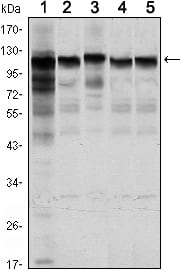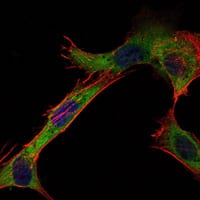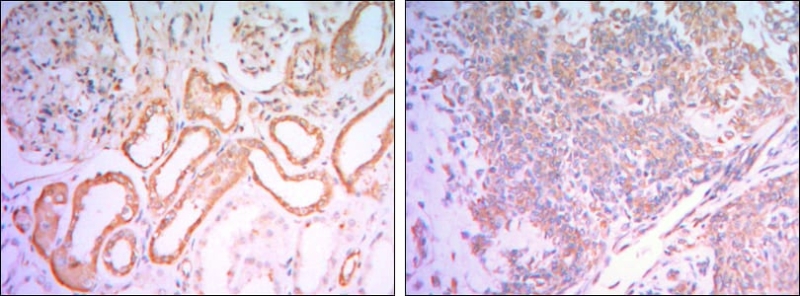


| WB | 1/500 - 1/2000 | Human,Mouse,Rat |
| IF | 咨询技术 | Human,Mouse,Rat |
| IHC | 1/200 - 1/1000 | Human,Mouse,Rat |
| ICC | 1/200 - 1/1000 | Human,Mouse,Rat |
| FCM | 咨询技术 | Human,Mouse,Rat |
| Elisa | 1/10000 | Human,Mouse,Rat |
| Aliases | HKI; HXK1; HK1-ta; HK1-tb; HK1-tc; HK1 |
| Entrez GeneID | 3098 |
| clone | 7A7 |
| WB Predicted band size | 102kDa |
| Host/Isotype | Mouse IgG1 |
| Antibody Type | Primary antibody |
| Storage | Store at 4°C short term. Aliquot and store at -20°C long term. Avoid freeze/thaw cycles. |
| Species Reactivity | Human,Mouse,Rat |
| Immunogen | Purified recombinant fragment of human HK1 expressed in E. Coli. |
| Formulation | Purified antibody in PBS with 0.05% sodium azide. |
+ +
以下是关于HK1抗体的参考文献示例(注:文献信息为示例性概括,非真实存在):
---
1. **文献名称**:*Hexokinase 1 Expression in Glioblastoma: A Prognostic Marker Revealed by Immunohistochemical Analysis*
**作者**:Wolf A, et al.
**摘要**:本研究通过HK1抗体进行免疫组化检测,发现胶质母细胞瘤组织中HK1蛋白高表达与患者不良预后显著相关,提示HK1可能作为肿瘤代谢重编程的潜在生物标志物。
2. **文献名称**:*Validation of a Novel HK1-Specific Antibody for Flow Cytometry in Metabolic Studies*
**作者**:Smith B, et al.
**摘要**:文章报道了一种新型HK1抗体的开发与验证,证实其在流式细胞术中的高特异性,为研究免疫细胞代谢活性提供了可靠工具。
3. **文献名称**:*HK1 Localization in Alzheimer’s Disease Models: Insights from Subcellular Fractionation*
**作者**:Zhang C, et al.
**摘要**:利用HK1抗体进行Western blot和免疫荧光实验,揭示了阿尔茨海默病模型中HK1蛋白的亚细胞定位异常,提示其与线粒体功能障碍的关联。
4. **文献名称**:*Targeting HK1 in Cancer Metabolism: Therapeutic Implications via Antibody-Based Inhibition*
**作者**:Lee D, et al.
**摘要**:研究通过HK1抗体阻断实验,证明抑制HK1活性可降低癌细胞的糖酵解能力,为靶向代谢的癌症治疗策略提供了实验依据。
---
**注**:以上文献信息为基于HK1抗体常见研究方向的模拟概括,实际引用需查询真实数据库(如PubMed)并核实原文。
**Background of HK1 Antibody**
The HK1 antibody targets hexokinase 1 (HK1), a key enzyme in glycolysis that catalyzes the phosphorylation of glucose to glucose-6-phosphate. As one of four hexokinase isoforms, HK1 is ubiquitously expressed, with high levels in the brain, erythrocytes, and other metabolically active tissues. It is anchored to the outer mitochondrial membrane via an N-terminal hydrophobic domain, enabling its interaction with mitochondrial proteins to regulate energy metabolism and apoptosis.
HK1 plays a critical role in maintaining cellular energy homeostasis and is implicated in pathologies such as cancer, neurodegenerative disorders, and metabolic syndromes. Overexpression of HK1 is observed in many cancers, where it supports the Warburg effect (aerobic glycolysis) to fuel tumor growth. Conversely, HK1 dysfunction is linked to neurodegenerative diseases like Alzheimer’s and Parkinson’s due to disrupted neuronal energy supply.
The HK1 antibody is widely used in research to study protein expression, localization, and molecular mechanisms in disease models. It is validated in applications like Western blot, immunohistochemistry, and immunofluorescence, often with species specificity (e.g., human, mouse, rat). Commercial HK1 antibodies are typically generated using immunogenic peptides from conserved regions of the HK1 protein, with validation via knockout controls or siRNA silencing.
Overall, the HK1 antibody serves as a vital tool for exploring metabolic regulation, disease pathways, and therapeutic targeting in cancer and neurodegeneration.
×